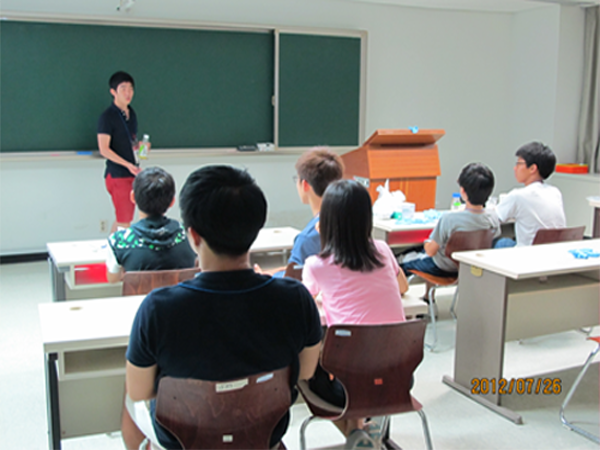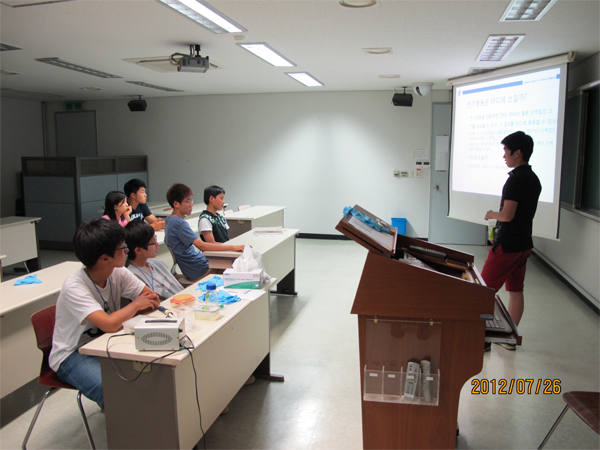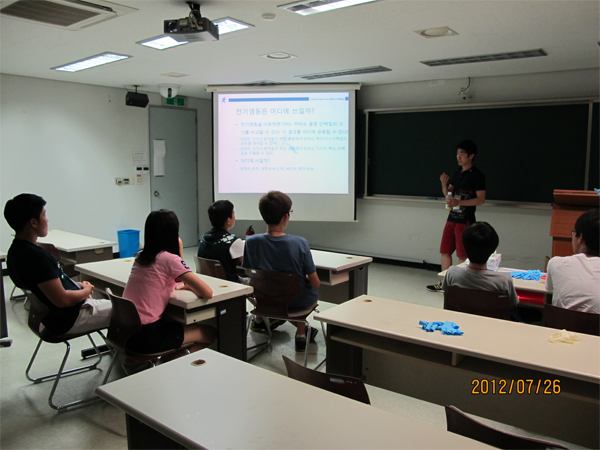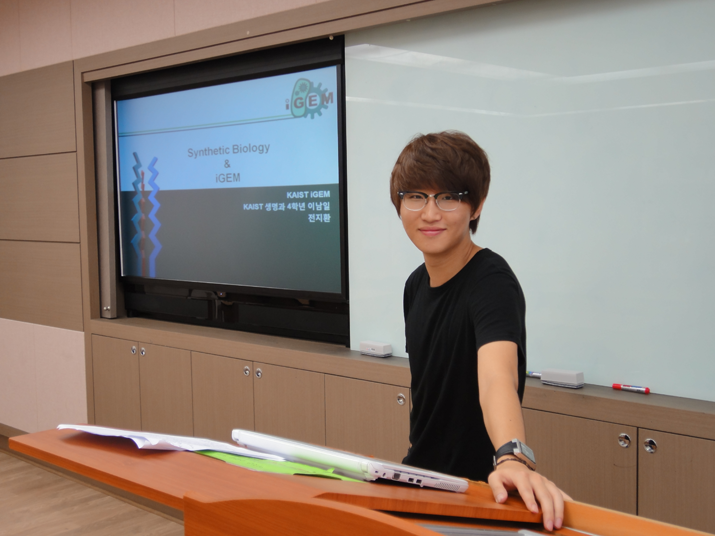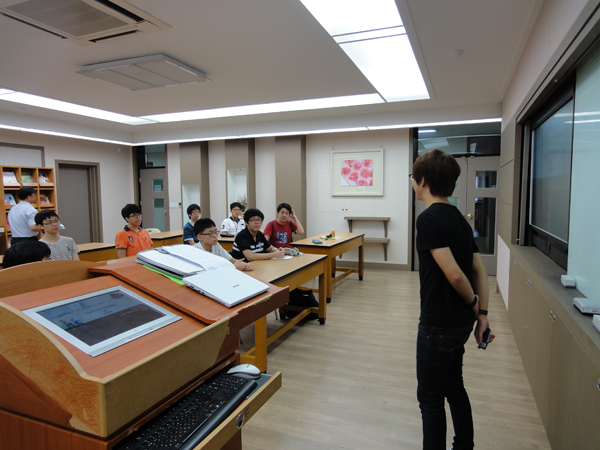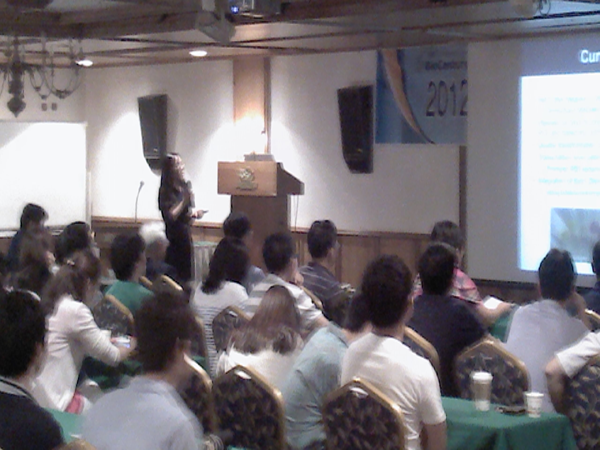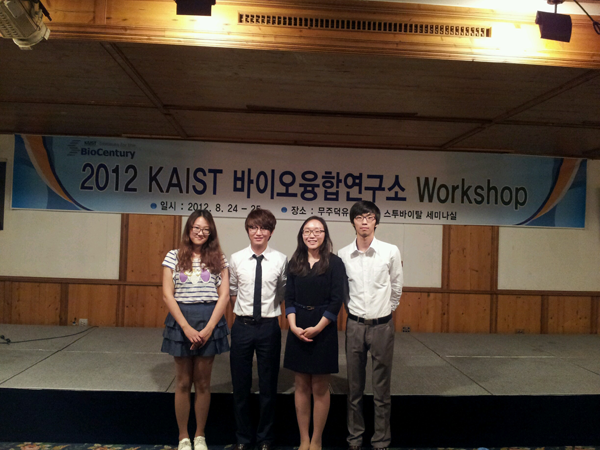Team:KAIST Korea/Plus Human
From 2012.igem.org
(Difference between revisions)
| (23 intermediate revisions not shown) | |||
| Line 43: | Line 43: | ||
z-index: 2; | z-index: 2; | ||
} | } | ||
| + | #kaistcontent #tab | ||
| + | { | ||
| + | width:200px; | ||
| + | height:30px; | ||
| + | position:relative; | ||
| + | background:#f2f3f3; | ||
| + | padding:5px 30px 5px 30px; | ||
| + | border:1px solid #f4f4f4; | ||
| + | margin : 0 20px 0 20px; | ||
| + | } | ||
| + | |||
#kaistcontent #little | #kaistcontent #little | ||
| Line 337: | Line 348: | ||
| + | #kaistcontent a { | ||
| + | color:#5a5b5e; | ||
| + | } | ||
| + | |||
| + | #kaistcontent a:hover{ | ||
| + | color:#94969a; | ||
| + | } | ||
</style> | </style> | ||
| Line 358: | Line 376: | ||
<div id="kaistcontent"> | <div id="kaistcontent"> | ||
| - | < | + | |
| - | + | <section id="top"> | |
| + | <img id="starter-grad" style="height:60px" src="https://static.igem.org/mediawiki/2012/9/95/Starter_gradient_kaist.png"></img> | ||
| - | <h1>Human Practices | + | <h1>Human Practices</h1> |
| + | </br></br> | ||
| - | + | <div align='center'> | |
| - | + | <a href="#no1"><span id="tab">Human Practice 1</span></a> | |
| - | + | ||
| + | <a href="#no2"><span id="tab">Human Practice 2</span></a> | ||
| + | |||
| + | <a href="#no3"><span id="tab">Human Practice 3</span></a> | ||
| + | </div> | ||
| + | </br></br></br> | ||
<span id="starter">W</span>e all know that the world economy largely rely on petroleum and it is now in a huge crisis due to its depletion. Many ideas and technologies have been suggested to replace the petroleum based system but they all have limitations. However, we, KAIST iGEM 2012 Team suggest a totally new but effective idea to substitute the conventional system. We try to produce an E. coli which can survive on CO<sub>2</sub> and H<sub>2</sub> as well as produce biomass, especially acetyl CoA. In this system, the substitute of petroleum system can resolve both problems of energy and material. In addition, it may relieve the global warming by consuming greenhouse gas. | <span id="starter">W</span>e all know that the world economy largely rely on petroleum and it is now in a huge crisis due to its depletion. Many ideas and technologies have been suggested to replace the petroleum based system but they all have limitations. However, we, KAIST iGEM 2012 Team suggest a totally new but effective idea to substitute the conventional system. We try to produce an E. coli which can survive on CO<sub>2</sub> and H<sub>2</sub> as well as produce biomass, especially acetyl CoA. In this system, the substitute of petroleum system can resolve both problems of energy and material. In addition, it may relieve the global warming by consuming greenhouse gas. | ||
</br></br> | </br></br> | ||
| Line 372: | Line 397: | ||
</br></br> | </br></br> | ||
<div id="smart-gallery"> | <div id="smart-gallery"> | ||
| - | <a href="https://static.igem.org/mediawiki/2012/2/25/KAIST_Slider_photo_1.png | + | <a href="https://static.igem.org/mediawiki/2012/2/25/KAIST_Slider_photo_1.png"><img src="https://static.igem.org/mediawiki/2012/2/25/KAIST_Slider_photo_1.png" /></a> |
| - | <a href="https://static.igem.org/mediawiki/2012/f/f3/KAIST_Slider_photo_2.png | + | <a href="https://static.igem.org/mediawiki/2012/f/f3/KAIST_Slider_photo_2.png"><img src="https://static.igem.org/mediawiki/2012/f/f3/KAIST_Slider_photo_2.png" /></a> |
| - | <a href="https://static.igem.org/mediawiki/2012/c/cb/KAIST_Slider_photo_3.png | + | <a href="https://static.igem.org/mediawiki/2012/c/cb/KAIST_Slider_photo_3.png"><img src="https://static.igem.org/mediawiki/2012/c/cb/KAIST_Slider_photo_3.png" /></a> |
| - | <a href="https://static.igem.org/mediawiki/2012/9/9b/KAIST_Slider_photo_4.png | + | <a href="https://static.igem.org/mediawiki/2012/9/9b/KAIST_Slider_photo_4.png"><img src="https://static.igem.org/mediawiki/2012/9/9b/KAIST_Slider_photo_4.png" /></a> |
| - | <a href="https://static.igem.org/mediawiki/2012/e/eb/KAIST_Slider_photo_5.png | + | <a href="https://static.igem.org/mediawiki/2012/e/eb/KAIST_Slider_photo_5.png"><img src="https://static.igem.org/mediawiki/2012/e/eb/KAIST_Slider_photo_5.png" /></a> |
| - | <a href="https://static.igem.org/mediawiki/2012/1/12/KAIST_Slider_photo_6.png | + | <a href="https://static.igem.org/mediawiki/2012/1/12/KAIST_Slider_photo_6.png"><img src="https://static.igem.org/mediawiki/2012/1/12/KAIST_Slider_photo_6.png" /></a> |
| - | <a href="https://static.igem.org/mediawiki/2012/8/89/KAIST_Slider_photo_7.png | + | <a href="https://static.igem.org/mediawiki/2012/8/89/KAIST_Slider_photo_7.png"><img src="https://static.igem.org/mediawiki/2012/8/89/KAIST_Slider_photo_7.png" /></a> |
| - | <a href="https://static.igem.org/mediawiki/2012/5/58/KAIST_Slider_photo_8.png | + | <a href="https://static.igem.org/mediawiki/2012/5/58/KAIST_Slider_photo_8.png"><img src="https://static.igem.org/mediawiki/2012/5/58/KAIST_Slider_photo_8.png" /></a> |
| + | <a href="https://static.igem.org/mediawiki/2012/4/43/KAIST_Gallery_11.png"><img src="https://static.igem.org/mediawiki/2012/4/43/KAIST_Gallery_11.png" /></a> | ||
| + | <a href="https://static.igem.org/mediawiki/2012/0/08/KAIST_DSC00962.png"><img src="https://static.igem.org/mediawiki/2012/0/08/KAIST_DSC00962.png" /></a> | ||
| + | <a href="https://static.igem.org/mediawiki/2012/1/1d/KAIST_DSC00966.png"><img src="https://static.igem.org/mediawiki/2012/1/1d/KAIST_DSC00966.png" /></a> | ||
| + | <a href="https://static.igem.org/mediawiki/2012/2/2a/KAIST_201218.png"><img src="https://static.igem.org/mediawiki/2012/2/2a/KAIST_201218.png" /></a> | ||
| + | <a href="https://static.igem.org/mediawiki/2012/7/7a/KAIST_DSC00956.png"><img src="https://static.igem.org/mediawiki/2012/7/7a/KAIST_DSC00956.png" /></a> | ||
| + | <a href="https://static.igem.org/mediawiki/2012/e/e4/KAIST_DSC00948.png"><img src="https://static.igem.org/mediawiki/2012/e/e4/KAIST_DSC00948.png" /></a> | ||
| + | <a href="https://static.igem.org/mediawiki/2012/d/db/KAIST_DSC00946.png"><img src="https://static.igem.org/mediawiki/2012/d/db/KAIST_DSC00946.png" /></a> | ||
| + | <a href="https://static.igem.org/mediawiki/2012/0/06/KAIST_DSC00944.png"><img src="https://static.igem.org/mediawiki/2012/0/06/KAIST_DSC00944.png" /></a> | ||
| + | <a href="https://static.igem.org/mediawiki/2012/b/b8/KAIST_2012-08-24_20.18.png"><img src="https://static.igem.org/mediawiki/2012/b/b8/KAIST_2012-08-24_20.18.png" /></a> | ||
| + | <a href="https://static.igem.org/mediawiki/2012/4/40/KAIST_1345980372237.png"><img src="https://static.igem.org/mediawiki/2012/4/40/KAIST_1345980372237.png" /></a> | ||
| + | |||
| + | |||
</div> | </div> | ||
| - | </br></br> | + | </section> |
| + | </br></br></br></br> | ||
| + | |||
| + | <section id="no1"> | ||
| + | <img id="starter-grad" style="height:140px" src="https://static.igem.org/mediawiki/2012/9/95/Starter_gradient_kaist.png"></img> | ||
| + | |||
| + | <h1>The First.</h1> | ||
| + | |||
| + | <span id="sub-title"> | ||
| + | The primary economy of the earth is photosynthesis. We human species make up only 0.5% of the whole biomass in the earth. However human civilization is based on petroleum which depletes every second. This is not sustainable. – Jeremy Rifkin </span> | ||
| + | </br></br></br></br> | ||
| + | |||
<ul> | <ul> | ||
| Line 405: | Line 453: | ||
For adults, who are actually running the society right now, we prepared something different from the lectures for kids or juveniles. In this case, we participated in a global conference held in KAIST, ICISTS-KAIST 2012, and introduced about synthetic biology and iGEM project. In the conference, we, lecturers, and delegates shared each other’s thoughts over synthetic biology and iGEM project. We believed there would be numerous global leaders who have actual powers to change the world, thus we viewed the conference as a chance for us to gain support from those powerful figures. To be specific, we participated in the talk about Appropriate Technology, which seemed to be related to our project and debated about the feasibility and sustainability of our project. Indeed, many of the people we met in the conference told us their opinions about synthetic biology and its role in society as well as its potential to improve human civilization. However, considering appropriate technology, synthetic biology and our team project have several obstacles to overcome. According to lecturers, most highly developed technologies have been enjoyed by 10% of global population who has 90% of global wealth. Since this situation is not sustainable at all, scientists and engineers started to focus on technologies for the other 90% of population. In other words, they started to figure out which technology generally benefits people, which will in turn improve the social status of unprivileged people and facilitate underdeveloped countries to be developed. The problem we are facing now is that synthetic biology is expensive and difficult to be understood by those who don’t major in biology, thus it cannot immediately benefit every single person in the world. Since the ultimate goal of iGEM is to generate Biobrick parts library and modify or sometimes synthesize organisms which will benefit human race in long term, we believe adopting the notion of appropriate technology to iGEM and synthetic biology would further improve this goal. | For adults, who are actually running the society right now, we prepared something different from the lectures for kids or juveniles. In this case, we participated in a global conference held in KAIST, ICISTS-KAIST 2012, and introduced about synthetic biology and iGEM project. In the conference, we, lecturers, and delegates shared each other’s thoughts over synthetic biology and iGEM project. We believed there would be numerous global leaders who have actual powers to change the world, thus we viewed the conference as a chance for us to gain support from those powerful figures. To be specific, we participated in the talk about Appropriate Technology, which seemed to be related to our project and debated about the feasibility and sustainability of our project. Indeed, many of the people we met in the conference told us their opinions about synthetic biology and its role in society as well as its potential to improve human civilization. However, considering appropriate technology, synthetic biology and our team project have several obstacles to overcome. According to lecturers, most highly developed technologies have been enjoyed by 10% of global population who has 90% of global wealth. Since this situation is not sustainable at all, scientists and engineers started to focus on technologies for the other 90% of population. In other words, they started to figure out which technology generally benefits people, which will in turn improve the social status of unprivileged people and facilitate underdeveloped countries to be developed. The problem we are facing now is that synthetic biology is expensive and difficult to be understood by those who don’t major in biology, thus it cannot immediately benefit every single person in the world. Since the ultimate goal of iGEM is to generate Biobrick parts library and modify or sometimes synthesize organisms which will benefit human race in long term, we believe adopting the notion of appropriate technology to iGEM and synthetic biology would further improve this goal. | ||
</span> | </span> | ||
| + | </br></br></br> | ||
| + | <div align='right'><a href="#top">▲Back to the top</a></div></br> | ||
| + | </section> | ||
</br></br></br></br></br> | </br></br></br></br></br> | ||
| - | |||
| - | |||
| - | |||
| - | |||
| - | |||
| - | |||
| - | + | <section id="no2"> | |
| + | <img id="starter-grad" style="height:80px" src="https://static.igem.org/mediawiki/2012/9/95/Starter_gradient_kaist.png"></img> | ||
| + | <h1>The Second.</h1> | ||
| + | <span id="sub-title">In Seoul Science High School</span> | ||
</br></br></br> | </br></br></br> | ||
| - | <span id=" | + | <span id="little"> |
| - | + | We went to Seoul Science High school to give out a lecture about synthetic biology and iGEM competition. As mentioned before, the reason to visit Seoul Science High school is that the students of that school seemed to be the most potential group of juveniles for future synthetic biologist as well as iGEMer. In addition, the school is known as the best science high school of Korea, thus we expected them to understand and grow interest about this specific field. Among numerous students of that school, those who are majoring in biology attended our lecture. </span></br> | |
| - | + | ||
| - | + | ||
| - | + | ||
| - | + | ||
| - | + | ||
| - | + | ||
| - | + | ||
| - | + | ||
| - | + | ||
| - | + | ||
| - | + | ||
| - | + | ||
| + | </br> | ||
| + | </br> | ||
| + | <div align='center'><img src="https://static.igem.org/mediawiki/2012/b/be/KAIST_human2.png"/></div> | ||
| + | </br> | ||
| + | </br> | ||
<span id="little"> | <span id="little"> | ||
| Line 436: | Line 477: | ||
<span id="little"> | <span id="little"> | ||
During the course, we could give them a new point of view that biology is not only about science but about engineering also due to this emerging field. Since they used to have lectures about traditional biology, our lecture was very refreshing and fascinating to them. Some of them were eager to ask us how they can prepare for this global competition. There, we could directly feel their enthusiasm toward science, especially for biology and saw the future of synthetic biology. We were asked to keep giving our lecture about this awesome field in other science high schools because students of Seoul Science High school wanted to share the idea and their dream with others. Even though they were aware of potential problems and issues of synthetic biology, we could easily notice that they understood well about them and still wanted to do their research in this field. Due to them, we are planning to visit other schools to introduce about synthetic biology and iGEM and distribute the creative idea even after 2012 iGEM competition ends. </span></br> | During the course, we could give them a new point of view that biology is not only about science but about engineering also due to this emerging field. Since they used to have lectures about traditional biology, our lecture was very refreshing and fascinating to them. Some of them were eager to ask us how they can prepare for this global competition. There, we could directly feel their enthusiasm toward science, especially for biology and saw the future of synthetic biology. We were asked to keep giving our lecture about this awesome field in other science high schools because students of Seoul Science High school wanted to share the idea and their dream with others. Even though they were aware of potential problems and issues of synthetic biology, we could easily notice that they understood well about them and still wanted to do their research in this field. Due to them, we are planning to visit other schools to introduce about synthetic biology and iGEM and distribute the creative idea even after 2012 iGEM competition ends. </span></br> | ||
| + | </br></br></br> | ||
| + | <div align='right'><a href="#top">▲Back to the top</a></div></br> | ||
| + | |||
| + | </section> | ||
| + | </br></br></br></br></br> | ||
| + | |||
| + | <section id="no3"> | ||
| + | <img id="starter-grad" style="height:80px" src="https://static.igem.org/mediawiki/2012/9/95/Starter_gradient_kaist.png"></img> | ||
| + | |||
| + | <h1>The Third.</h1> | ||
| + | <span id="sub-title">Presentation in Muju</span> | ||
| + | </br></br></br> | ||
| + | <span id="little"> | ||
| + | We joined a retreat of KAIST Institute laboratories held in Muju, Korea. It was a large event in which every lab and its members of KAIST Institute has participated to share ideas about numerous fields of biology. Most of the leading figures of Korean biologist society were there in the retreat and we have presented about our project in front of them for 20 minutes. We also introduced iGEM and shared our own ideas about synthetic biology and got some feedbacks. It was a unforgettable experience since it was the first time for us to meet experts of this field and share our thoughts. | ||
| + | </span> | ||
| + | |||
| + | </br> | ||
| + | </br> | ||
| + | <div align='center'><img src="https://static.igem.org/mediawiki/2012/8/87/KAIST_human3.png"/></div> | ||
| + | </br> | ||
| + | |||
| + | </br></br></br> | ||
| + | <div align='right'><a href="#top">▲Back to the top</a></div></br> | ||
| + | |||
| + | |||
| + | </section> | ||
| + | </br> | ||
</div> | </div> | ||
Latest revision as of 00:53, 27 September 2012


2012 KAIST Korea
Mail : kaist.igem.2012@gmail.com
Twitter : twitter.com/KAIST_iGEM_2012
Facebook : www.facebook.com/KAISTiGEM2012

Plus : Human Practices


Human Practices
We all know that the world economy largely rely on petroleum and it is now in a huge crisis due to its depletion. Many ideas and technologies have been suggested to replace the petroleum based system but they all have limitations. However, we, KAIST iGEM 2012 Team suggest a totally new but effective idea to substitute the conventional system. We try to produce an E. coli which can survive on CO2 and H2 as well as produce biomass, especially acetyl CoA. In this system, the substitute of petroleum system can resolve both problems of energy and material. In addition, it may relieve the global warming by consuming greenhouse gas. We are working on a project which may have great effects to our future. We believe it to be helpful and useful for human civilization but we still have to consider both the bright and dark sides of it. To do so, we have or have planned to introduce the concept of our project and synthetic biology and then share ideas about them with the public. Since synthetic biology is not very familiar to the public in Korea, we prepared some lectures for this. As people of different ages would have different thoughts and thus give various opinions about synthetic biology, we divided the public into three groups; kids (middle school students), juveniles (high school students), and adults. We made contact to most prosperous and leading people of each group and have talked about synthetic biology and the project of KAIST iGEM 2012.
The First.
The primary economy of the earth is photosynthesis. We human species make up only 0.5% of the whole biomass in the earth. However human civilization is based on petroleum which depletes every second. This is not sustainable. – Jeremy Rifkin- Talk with middle school students
- Talk with high school students
- Talk with adults

The Second.
In Seoul Science High School We went to Seoul Science High school to give out a lecture about synthetic biology and iGEM competition. As mentioned before, the reason to visit Seoul Science High school is that the students of that school seemed to be the most potential group of juveniles for future synthetic biologist as well as iGEMer. In addition, the school is known as the best science high school of Korea, thus we expected them to understand and grow interest about this specific field. Among numerous students of that school, those who are majoring in biology attended our lecture.

The Third.
Presentation in Muju We joined a retreat of KAIST Institute laboratories held in Muju, Korea. It was a large event in which every lab and its members of KAIST Institute has participated to share ideas about numerous fields of biology. Most of the leading figures of Korean biologist society were there in the retreat and we have presented about our project in front of them for 20 minutes. We also introduced iGEM and shared our own ideas about synthetic biology and got some feedbacks. It was a unforgettable experience since it was the first time for us to meet experts of this field and share our thoughts.
 "
"







